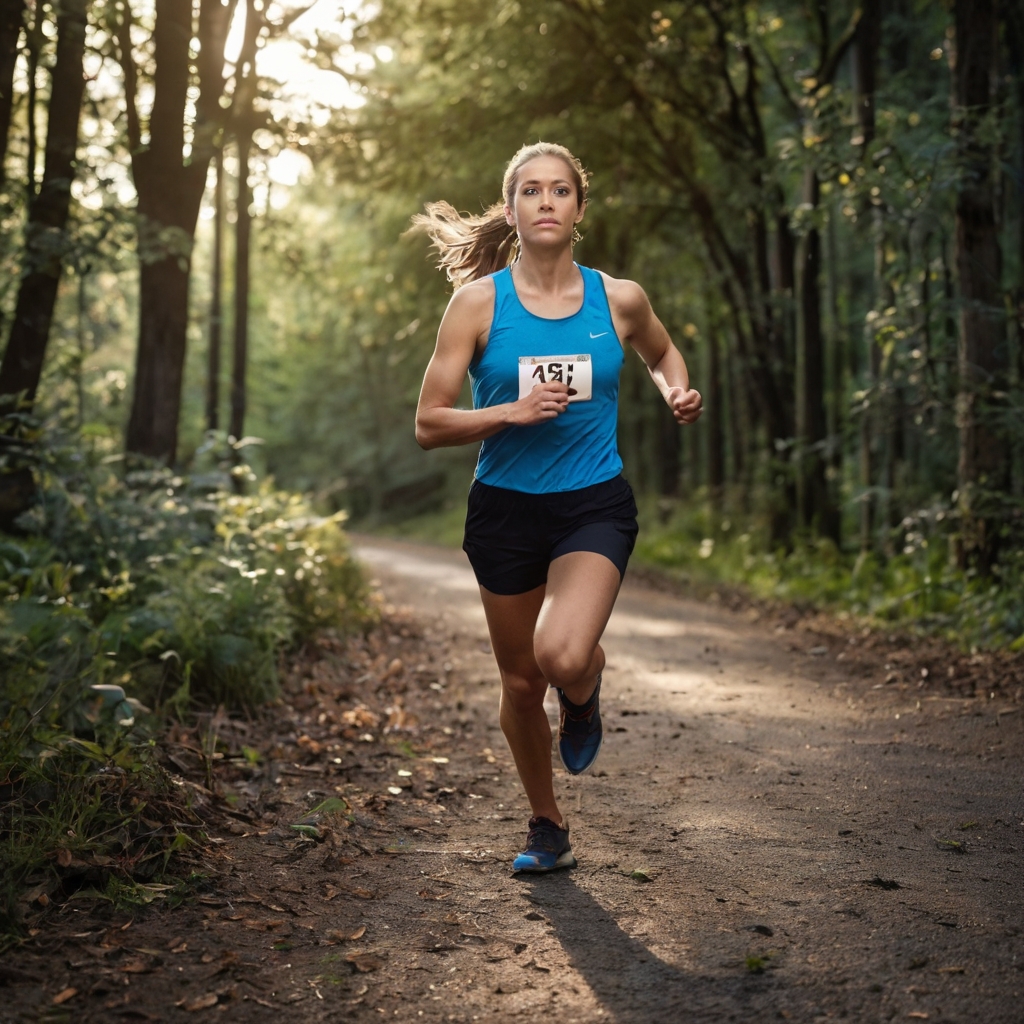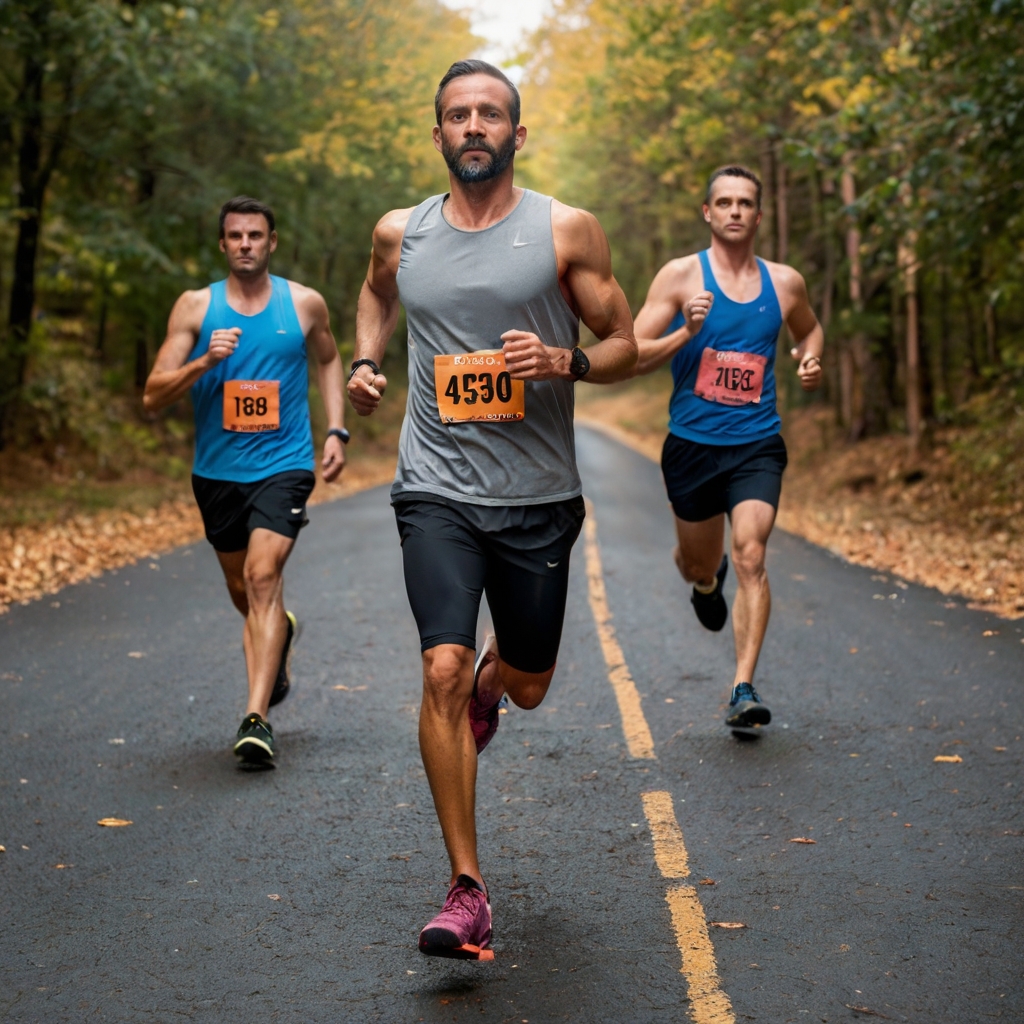What’s a good 15k time? The average runner finishes a 15k in 01:16:35, regardless of age or gender. But these numbers can change quite a bit based on several factors.
A 15k race stretches 9.3 miles. Runners usually take between 19,000 to 23,000 steps to reach the finish line. Men’s good finishing time hovers around 01:11:55, while women aim to complete it in about 01:23:32. Elite athletes have taken this sport to new heights, with the world record at an amazing 40:42. Most runners finish their 15k in about 1:43, keeping up an 11-minute pace throughout.
This piece gets into target times by age and gender that give realistic standards for runners at every level. You’ll learn about how 15k compares to other race distances and get training tips to improve your time. These insights will help you set achievable goals for your next 15k race.

Table of Contents
What is a 15k in miles?
The 15k distance strikes a sweet spot in the running world. Runners who want to go beyond shorter races but aren’t ready for half marathons will find this distance just right.
How far is 15k in miles?
A 15k race equals 9.3 miles. This number comes from the standard metric-to-imperial formula where 1 kilometer equals about 0.621371 miles. To give you a better idea, running a 15k is like circling a standard baseball field about 135 times or completing about 37.5 laps around a standard outdoor track.
Picture this – at an 11-minute mile pace, you’d finish a 15k in about 1 hour and 43 minutes. Most intermediate runners can achieve this with the right training.
Why 15k is a popular race distance
The 15k has become a favorite “between” distance among runners. It’s the perfect next step for those who’ve mastered 5k and 10k races but don’t feel ready for a half marathon yet.
The 15k gives experienced runners something new to try. Coach Hal Higdon puts it well, saying this 9.3-mile distance offers “a different distance, one to relieve boredom”. Many runners hit their best times at this distance because it balances speed and endurance perfectly.
The distance works great for runners who want to build their mileage slowly. You’ll need more training than shorter races, but it won’t overwhelm you while you push your limits.
How 15k compares to 10k and half marathon
The 15k fits right between two popular race distances, creating a natural step up in a runner’s experience:
| Race Distance | Miles | Kilometers | Typical Completion Time |
|---|---|---|---|
| 10k | 6.2 | 10 | 40-60 minutes |
| 15k | 9.3 | 15 | 1-1.5 hours |
| Half Marathon | 13.1 | 21.1 | 1.5-2 hours |
The math shows that a 15k is 50% longer than a 10k race. It makes up about 71% of a half marathon distance. This makes it valuable for runners building toward longer races.
Running a 15k feels quite different from a 10k. You can’t keep the same fast pace throughout like in a 10k – you need smarter pacing and more endurance. Yet you won’t need the intense training that a half marathon demands with its longer runs and higher weekly mileage.
Runners who’ve just finished their first 10k will find the 15k a great next challenge. It pushes them to train harder but isn’t so tough that it scares them away.
What is a good 15k time by age and gender?
A runner’s performance data helps us understand what makes a good 15k time. The average runner completes a 15k in 1:16:35. This standard changes based on age, gender, and how much training someone has done.
Average 15k time for men
Male runners typically finish a 15k in 1:11:55. Age plays a big role in these times:
- Young adults (20-35): Most men run consistently around 1:11:55
- Middle-aged (40-55): Times start getting longer – 40-year-olds average 1:14:23 while 50-year-olds reach 1:20:46
- Seniors (60+): The clock shows about 1:28:21 for 60-year-olds
Scientists have found that running speed decreases by 0.2% each year. Training makes a huge difference too. Well-trained men run 15.7% faster than those who train less.
A 30-year-old man’s expected finish times vary by experience level:
- Beginner: 1:40:56
- Intermediate: 1:11:55
- Elite: 56:16
Average 15k time for women
Women cross the finish line at 1:23:32 on average. Research shows they run about 13% slower than men. Age affects women’s times too:
- Young adults (20-35): Peak running years show times between 1:23:32 and 1:24:32
- Middle-aged (40-55): Times lengthen gradually to 1:34:38 for 50-year-olds
- Seniors (60+): The clock typically stops at 1:46:58 for 60-year-olds
A 30-year-old woman’s target times might look like this:
- Beginner: 1:53:47
- Intermediate: 1:23:37
- Elite: 1:06:23
Good times really depend on each runner’s situation. Weekend warriors might celebrate breaking 1:30:00, while competitive runners aim to finish under 1:10:00.
Fastest recorded 15k times
Elite runners show us what humans can achieve. Uganda’s Jacob Kiplimo holds the men’s world best at 40:42. He actually ran even faster during his half marathon world record in Lisbon 2021, hitting the 15k mark at 40:27.
Ethiopia’s Letesenbet Gidey leads the women with 44:20. Other amazing performances include Tirunesh Dibaba’s 46:29 and Mizan Alem’s road racing debut at 46:51.
These world-class times should inspire rather than intimidate. Elite runners finish about 46% faster than average runners, who typically need about 1:43 at an 11-minute mile pace.
Runners should set goals based on their own age, gender, and fitness level instead of chasing world records.

15k pace breakdown by ability level
Pace—measured in minutes per kilometer or mile—is the life-blood of effective race planning. Looking at different ability levels and how they translate to ground pace targets helps us understand what is a good 15k time.
Beginner to elite pace ranges
A runner’s ability level shapes the expected pace for a 15k run dramatically. Detailed running data shows substantial pace differences between ability categories:
| Ability Level | Average Pace (min/km) | Average Pace (min/mile) |
|---|---|---|
| Beginner | 6:44 – 8:03 | 10:50 – 12:58 |
| Novice | 5:37 – 6:43 | 9:02 – 10:49 |
| Intermediate | 4:48 – 5:44 | 7:43 – 9:14 |
| Advanced | 4:12 – 5:01 | 6:45 – 8:05 |
| Elite | 3:45 – 4:29 | 6:02 – 7:14 |
The gap between beginner and elite performances sits at about 3 minutes per kilometer. This stark contrast shows why runners should set goals based on their current ability instead of comparing themselves to elite standards.
How pace changes with age
Age affects running performance, though not as drastically as many might think. Research shows performance typically drops by about 1% yearly until age 70. After that, the decline speeds up to about 2% each year.
This means adding 3-5 seconds per kilometer each year after age 35 in a 15k run. The biggest changes happen after 60. To cite an instance, a 60-year-old intermediate runner averages 5:53 min/km compared to a 30-year-old’s 4:48 min/km.
The performance gap between beginners and elites gets smaller in older age groups. This suggests that consistent training becomes more valuable as runners age.
Using pace to set realistic goals
Setting the right pace goals needs honest self-assessment and reliable data. Greg McMillan’s Running Pace Calculator, used by over 20 million runners, shows that effective pace targets blend physiological variables with ground performance data.
Your ideal 15k pace depends on:
- Recent performance in a different race distance
- Training history and current fitness level
- Environmental factors like heat, humidity, and course elevation
First-time 15k runners should find their comfortable running pace and use a pace chart to estimate finish time. Runners with target finish times can use pace charts to determine their needed minute-per-mile speed throughout the race.
Keep in mind that appropriate pacing varies among different runner profiles. A comfortable training pace might need adjustments on race day based on conditions and course challenges.
Training tips to hit your target 15k time
Your best 15k performance just needs a well-laid-out training approach. You might wonder what is a good 15k time for your age group or want to finish strong. These evidence-based strategies will prepare you for the 9.3-mile challenge.
How long to train for a 15k
The most effective 15k training plans last 8-12 weeks, based on your current fitness level. You should run at least 1.5 miles comfortably before starting a dedicated 15k program. A 12-week plan gives beginners enough time to build endurance and reduce injury risk. Runners with experience can choose shorter 8-10 week programs if they already have a solid running foundation.
Weekly mileage and long runs
The best 15k training involves running 3-5 days each week. Beginners should run 8-18 miles weekly and include one longer run. Your weekly long run should grow from 6 miles to about 10 miles during peak training. More experienced runners can handle higher volume, with intermediate programs reaching 15-25 miles weekly.
Cross-training and strength work
Two days of cross-training each week makes your running program better. Swimming, cycling, or elliptical training give you cardiovascular benefits without running’s repetitive impact. Adding 1-2 weekly strength sessions prevents injuries and boosts running economy. Light weights with high repetitions work better than heavy lifting. Your core strength exercises build stability and make your running form better.
Rest and recovery essentials
Your body needs rest days to perform well. Take at least one dedicated rest day weekly, usually after your long run. “Step-back” weeks every third week help – reduce your mileage slightly so your body recovers before moving forward. Good recovery means staying hydrated, eating protein within 30 minutes after workouts, and sleeping enough. Foam rolling, gentle stretching, and leg elevation can speed up your muscle repair substantially.
Note that consistency matters more than occasional intense workouts. Being organized and building your endurance steadily will help you reach your target 15k time.
How to know you’re ready for a 15k race
A 15k (9.3 miles) race tests both your physical abilities and mental strength. Experienced runners know this middle-distance challenge needs more than just putting in the miles.
Signs of physical readiness
Your body sends clear signals when you’re ready to take on a 15k run. You should run at least 8 miles comfortably in your long runs. This distance serves as a good standard for runners moving up from 5k or 10k races. Your recovery patterns are a great way to get feedback. Your body has built up the right resilience when you can run easily the next day after long training sessions with little soreness.
Your current training consistency tells a lot too. Runners who managed to keep steady mileage without big gaps for 8-10 weeks show better performance on race day. Your fitness level is right when your goal pace feels manageable instead of draining during training runs.
Mental preparation checklist
Race-day success depends heavily on your mental state. Build your confidence by visualizing yourself running strong and composed through each part of the course. Know your best performance zone – some runners do better when they’re relaxed, others when they’re pumped up.
Seasoned racers know how to handle negative thoughts. They quickly acknowledge doubts and get back to their race plan. Practice your pre-race routine to cut down anxiety and save mental energy.
What to expect on race day
Race morning needs good planning. Get there early to handle parking, check-in, and warm up properly. Many runners break the distance into three parts using the 3×5k method. They start at half-marathon pace and slowly pick up to 10k pace.
When you eat matters by a lot. Have your usual breakfast 1.5-2 hours before the start. Get everything ready the night before – pin your number, charge your devices, and set out your clothes. This cuts down stress in the morning.
Summing all up
A good 15k time depends on your personal factors. Age, gender, training level, and experience are the foundations of realistic expectations for this 9.3-mile challenge. The average completion time stands at 01:16:35, with men finishing around 01:11:55 and women around 01:23:32.
The 15k distance provides that sweet spot for runners who want to go beyond shorter races but aren’t ready for half marathon training. This distance is exactly 50% longer than a 10k and only 71% of a half marathon, making it a perfect milestone in any runner’s development.
Pace differences between ability levels tell the whole story. Beginners usually maintain 10:50-12:58 minutes per mile while elite runners clock 6:02-7:14 minutes per mile. You should set realistic goals based on your current ability instead of comparing yourself to world records. This approach helps you progress steadily.
Your 15k training needs dedication over 8-12 weeks. Build your weekly mileage gradually and include one longer run that gets progressively longer. Cross-training and strength work make your running stronger. Rest and recovery prevent injuries and help you perform better.
You’ll know you’re ready for a 15k when you can run 8 miles comfortably and recover well. Mental preparation through visualization and race-day planning helps too. Your finish time doesn’t matter as much as the achievement itself.
Elite runners might finish under 45 minutes, but most runners should focus on beating their own times. The 15k distance rewards consistent training and smart race execution, whatever your target time might be. Every second counts when you chase your personal best at this challenging yet available distance.
Here are some FAQs about what is a good 15k time:
Is running 15km in 1 hour good?
Yes, running 15km in 1 hour is an excellent and very competitive time, equating to a 4:00 min/km pace. This performance level is typically achieved by well-trained amateur runners or competitive athletes. For most recreational runners, this would be considered an exceptional benchmark when considering what is a good time for 15k.
Is running 15 km difficult?
Running 15km can be challenging for beginners but becomes manageable with consistent training and proper conditioning. The difficulty depends on your current fitness level, training background, and pacing strategy. With adequate preparation, determining what is a good time for 15k run becomes a more relevant question than simply completing the distance.
Can the average person run a 15k?
The average sedentary person cannot immediately run a 15k, but most healthy individuals can build up to this distance with proper training over several months. With consistent training that gradually increases mileage, completing a 15k is an achievable goal for many motivated individuals. This training period also helps runners establish what is a good 15k run time for their fitness level.
How long does it take to get ready for 15k?
For a beginner, it typically takes 8-12 weeks of consistent training to safely build up to running 15km. More experienced runners might need less time depending on their current base fitness level. This training period allows runners to not only complete the distance but also work toward achieving what is a good time for a 15k based on their capabilities.
What is a decent 15K time?
A decent 15K time for recreational runners typically falls between 1:20 and 1:40 (80-100 minutes), which represents a pace of approximately 5:20 to 6:40 per kilometer. More competitive runners might aim for times under 1:15, while beginners might be pleased with finishing under 2 hours. Determining what is a good time for 15k depends greatly on individual factors like age, gender, and experience level.
What is the 80% rule in running?
The 80/20 rule in running suggests that 80% of your weekly training should be at low intensity (easy conversation pace), while only 20% should be at moderate to high intensity. This approach helps prevent injury while building endurance and improving performance, which can help runners achieve what is a good 15k run time. It’s a fundamental principle followed by many successful running programs.
Is running 15km impressive?
Yes, running 15km is impressive for most people as it represents a significant endurance achievement that requires dedication and training. Completing this distance places you well above the average fitness level of the general population. The accomplishment becomes even more impressive when considering what is a good time for 15k and achieving a competitive time for your age and gender group.
Is 10km in 1 hour 20 minutes good?
A 10km time of 1 hour 20 minutes (8:00 min/km pace) is a respectable starting point for beginners and represents a good foundation to build upon. While not competitive, this pace shows consistency and provides a solid base for improving distance and speed toward longer races. As you progress, you can work toward better understanding what is a good time for a 15k as your next distance goal.


